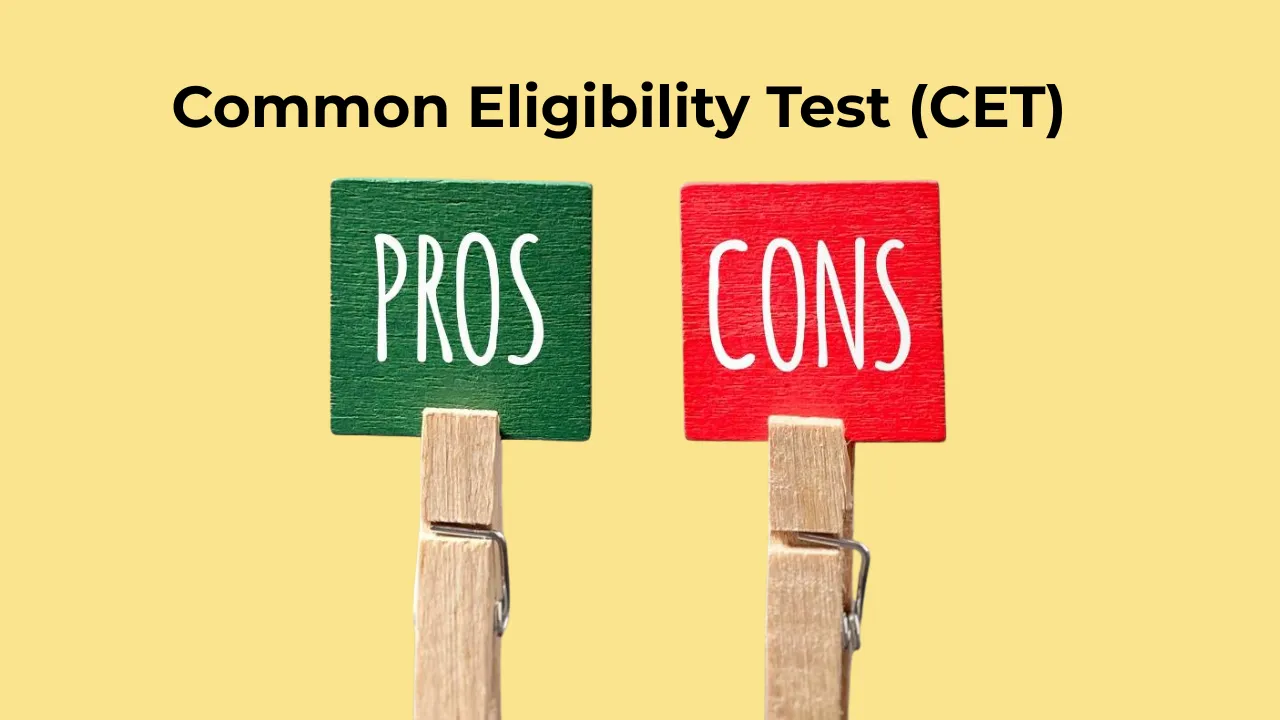Common Eligibility Test: The Common Eligibility Test is a big reform in the Indian recruitment system. It is designed to streamline the selection process for government jobs by replacing multiple preliminary exams with a single standardized test.
This article covers everything you need to know about the Common Eligibility Test, including its benefits and drawbacks. Whether you’re a government job aspirant or just curious about the change, this guide gives a full overview of CET, how it works, and its overall impact on recruitment.
What is the Common Eligibility Test?
The Common Eligibility Test is a centralized exam planned by the government to screen candidates for Group B and Group C posts in various government departments. The test will be conducted by the National Recruitment Agency (NRA), and it will replace the preliminary exams of SSC, RRB, and IBPS.
CET aims to reduce the burden of multiple exams and create a fair, transparent system. The scores from CET will be valid for three years, and candidates can use them to apply for various positions at the state and central levels.
Pros of the Common Eligibility Test
The Common Eligibility Test brings many benefits for candidates and the government alike. Here are the top advantages:
1. One Exam for Multiple Jobs
Candidates no longer need to prepare and appear for different preliminary exams. A single CET score can be used to apply for various government job openings.
2. Saves Time and Money
Earlier, candidates had to travel to different cities multiple times for various exams. CET reduces the number of exams and saves money on travel, lodging, and application fees.
3. Equal Opportunity
With CET, every candidate will take the same exam, reducing chances of bias and improving fairness in the recruitment process.
4. Wide Reach and Local Centers
The government aims to set up at least one CET exam center in every district, making it easier for rural and remote candidates to access opportunities.
5. Valid Score for Three Years
The CET score remains valid for three years, giving candidates multiple chances to apply without retaking the test each time.
Cons of the Common Eligibility Test
While the Common Eligibility Test has many benefits, it also comes with some challenges and concerns:
1. One Exam Can’t Fit All
Different job roles may need different types of skills. Using one standard exam for all posts might not fully test job-specific knowledge.
2. High Competition
Since many candidates will now apply through a single exam, the level of competition may increase, making it tougher to stand out.
3. Implementation Issues
Setting up new infrastructure and exam centers in every district is a big task. Any delay in this setup can create confusion and impact exam fairness.
4. Language and Accessibility Barriers
Although CET will be offered in multiple languages, not all regions may get equal access to quality study materials or exam guidance in their preferred language.
5. No Final Selection
CET only replaces the preliminary stage. Candidates will still have to clear the mains and interviews conducted by individual recruitment bodies, which may lead to longer wait times.
Key Benefits of CET in Simple Points
- Single preliminary exam for multiple departments
- Cost-effective and time-saving for candidates
- Transparent and fair recruitment process
- Boosts rural participation with local exam centers
- Valid score usable for three years
Possible Drawbacks of CET in Simple Points
- May not test all job-specific skills
- Increased competition for limited posts
- Challenges in smooth implementation
- Language support may vary
- Only first step; final selection depends on later stages
FAQs
1. What is the Common Eligibility Test?
It’s a single exam for screening candidates for Group B and Group C government jobs conducted by the NRA.
2. Will CET replace all government exams?
No, it only replaces the preliminary stage of SSC, RRB, and IBPS exams. Mains and interviews will still be conducted separately.
3. How long is the CET score valid?
The CET score will remain valid for three years from the date of result.
4. Will CET be held in local languages?
Yes, CET will be offered in multiple regional languages to ensure broader accessibility.
5. Can I apply for multiple jobs using one CET score?
Yes, you can use the same CET score to apply for various positions as long as it is valid.
Final Thought
The Common Eligibility Test is a bold and helpful step towards simplifying India’s government job recruitment system. While it brings convenience and fairness, proper planning and support are needed to deal with the challenges. Candidates should focus on preparing well and stay updated with the latest information on CET.
Are you planning to take the CET? Share your thoughts or check out more tips and study resources to boost your chances in upcoming exams!

